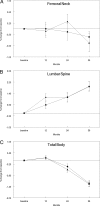Effect of vitamin K supplementation on bone loss in elderly men and women
- PMID: 18252784
- PMCID: PMC2291488
- DOI: 10.1210/jc.2007-2490
Effect of vitamin K supplementation on bone loss in elderly men and women
Abstract
Context: Vitamin K has been implicated in bone health, primarily in observational studies. However, little is known about the role of phylloquinone supplementation on prevention of bone loss in men and women.
Objective: The objective of this study was to determine the effect of 3-yr phylloquinone supplementation on change in bone mineral density (BMD) of the femoral neck bone in older men and women who were calcium and vitamin D replete.
Design, participants, and intervention: In this 3-yr, double-blind, controlled trial, 452 men and women (60-80 yr) were randomized equally to receive a multivitamin that contained either 500 mug/d or no phylloquinone plus a daily calcium (600 mg elemental calcium) and vitamin D (400 IU) supplement.
Main outcome measures: Measurements of the femoral neck, spine (L2-L4), and total-body BMD, bone turnover, and vitamins K and D status were measured every 6-12 months. Intent-to-treat analysis was used to compare change in measures in 401 participants who completed the trial.
Results: There were no differences in changes in BMD measurements at any of the anatomical sites measured between the two groups. The group that received the phylloquinone supplement had significantly higher phylloquinone and significantly lower percent undercarboxylated osteocalcin concentrations compared with the group that did not receive phylloquinone. No other biochemical measures differed between the two groups.
Conclusions: Phylloquinone supplementation in a dose attainable in the diet does not confer any additional benefit for bone health at the spine or hip when taken with recommended amounts of calcium and vitamin D.
Figures
References
-
- Booth SL, Tucker KL, Chen H, Hannan MT, Gagnon DR, Cupples LA, Wilson PW, Ordovas J, Schaefer EJ, Dawson-Hughes B, Kiel DP 2000 Dietary vitamin K intakes are associated with hip fracture but not with bone mineral density in elderly men and women. Am J Clin Nutr 71:1201–1208 - PubMed
-
- Booth SL, Broe KE, Peterson JW, Cheng DM, Dawson-Hughes B, Gundberg CM, Cupples LA, Wilson PW, Kiel DP 2004 Associations between vitamin K biochemical measures and bone mineral density in men and women. J Clin Endocrinol Metab 89:4904–4909 - PubMed
-
- Gundberg CM, Nieman SD, Abrams S, Rosen H 1998 Vitamin K status and bone health: an analysis of methods for determination of undercarboxylated osteocalcin. J Clin Endocrinol Metab 83:3258–3266 - PubMed
-
- Binkley NC, Krueger DC, Kawahara TN, Engelke JA, Chappell RJ, Suttie JW 2002 A high phylloquinone intake is required to achieve maximal osteocalcin γ-carboxylation. Am J Clin Nutr 76:1055–1060 - PubMed
-
- Booth SL, Lichtenstein AH, O’Brien-Morse M, McKeown NM, Wood RJ, Saltzman E, Gundberg CM 2001 Effects of a hydrogenated form of vitamin K on bone formation and resorption. Am J Clin Nutr 74:783–790 - PubMed
Publication types
MeSH terms
Substances
Grants and funding
LinkOut - more resources
Full Text Sources
Medical



